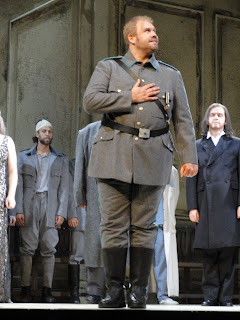
(review in english below)
Chegou a vez de Mozart em HD, com a novíssima produção de Don Giovanni.
O recentemente apontado maestro principal do MET, Fabio Luisi, dirigiu a Orquestra do MET de forma sublime, oferecendo-nos um som de qualidade superlativa, embora amplamente potenciado pela transmissão HD e, por vezes, não perfeitamente balanceado. Tomando as rédeas do cravo nos recitativos, tornou-se num maestro mais próximo dos cantores e foi clara a interacção milimétrica entre ambos.

Mariusz Kwiecien foi Don Giovanni e já brilhou, segundo consta, neste papel nos melhores palcos da Europa, tendo chegado agora a vez de NY. Assombrado pelo problema musculo-esquelético que o levou a cirurgia há 15 dias, mesmo assim esteve recuperado para participar nesta transmissão em directo. Kwiecien canta o papel com uma qualidade invejável para qualquer barítono mas, na minha opinião, tivemos dois Don Giovanni em palco hoje e o que os separou foi o intervalo. No primeiro acto, a sua interpretação foi pouco convincente. Não vi um homem seguro na sedução ou maléfico nas artimanhas e na morte. Na ária de Donna Elvira “Non ti fidar, o mísera” esteve pouco entrosado com a mesma e muito abaixo do esperado ao fazer crer a Donna Anna e Don Ottavio que Elvira é louca. O segundo acto, iniciado com a troca de papéis com Leporello, foi magnífico em termos interpretativos, culminando na fantástica última cena com o Commendadore.


Marina Rebeka foi Donna Anna. É díficil, ao primeiro veslumbre, não nos perdermos nos seus olhos azuis, contrastando com o cabelo moreno e a face de traços redondos… A voz é cristalina, de timbre bonito e potente. Contudo, parece por vezes cantar o papel de Donna Anna como se se tratasse da Rainha da Noite de A Flauta Mágica – em potência e força. As expressões faciais procuram transmitir as emoções mas a voz não as segue, a dinâmica é demasiado subtil, impedindo que só por ela transmita as emoções. Talvez seja apenas artefacto da transmissão e ao vivo se sinta de modo diferente.

O Don Ottavio de Ramón Vargas foi lírico e nobre, fazendo as árias da capo como deve ser, com a repetição expressivamente um pouco diferente da exposição. No início pareceu-me não ter o timbre ideal para o papel mas cedo me rendi à sua interpretação.


The newly appointed principal conductor of the MET, Fabio Luisi, directed the MET Orchestra in a sublime way, offering us a superlative sound quality, though largely enhanced by the HD broadcast, and sometimes not perfectly balanced. Taking the reins of the harpsichord in the recitatives, he became a conductor closest to the singers and was a millimetric and clear interaction between the two.
The staging by Michael Grandage is classic and simple, where the fantastic costumes dominate ranging from the simple and classy dress of Zerlina to a classy and simplicity of the dress of Donna Elvira. We almost felt the desire to walk down the street with the period buildings in the background, entering the room of Don Giovanni and even the cemetery which was no frightening at all with the various figures in stone, including the Commendadore one that literally allows the stated mechanical movements of the libretto.

Luca Pisaroni was a fantastic Leporello. A great sense of comedy, which I also felt in progress along the opera, coupled with a voice of excellent quality.
In a group of stars that were, in general, at their highest level, Barbara Frittoli was undoubtedly the leading interpretive. The age brought her the maturity to the role of Elvira. In every gesture, every expression, every note, the character feels so clean and clear. Superb!

Marina Rebeka was Donna Anna. It is difficult, at a first glance, not to get lost in her blue eyes, contrasting with the brunette hair and round face features ... The voice is crystal clear, with a beautiful and powerful tone. However, it seems at times to sing the role of Donna Anna as if it were the Queen of the Night from The Magic Flute - in power and strength. Facial expressions seek to convey the emotions but do not follow the voice, the dynamic is too subtle, not allowing it to convey the emotions only by itself. Maybe it's just an artifact of the live transmission and it will feel differently in the opera house.

Don Ottavio by Ramón Vargas was lyrical and noble, doing the da capo arias as it should be done, with a little interpretative change, different from the exposure. At first he seemed not to have the right tone for the role but soon I surrendered to his interpretation.

Stefan Kocán was perfect as the Commendatore. The voice has the perfect depth and pitch for the role and the last scene was colossal.

Mojca Erdmann and Joshua Bloom did the Zerlina and Masetto couple. I knew Erdmann recently with her album with Mozart arias and I fell in love with her. I loved his interpretation although I think that was not always ideal, with many smiles at times that they would not be expected for the character. But the voice is so pure and beautiful that we almost can question how it comes out from such an apparent frail body. Bloom was perhaps the most cohesive of the male performers. From the beginning of the opera his excelent capabilities as an actor captivate us and remains until the end, coupled with a strong voice. I even thought I would prefer to see him on the first act as the Don instead of Kwiecien... The interaction with Erdmann was passionate and exciting.


























